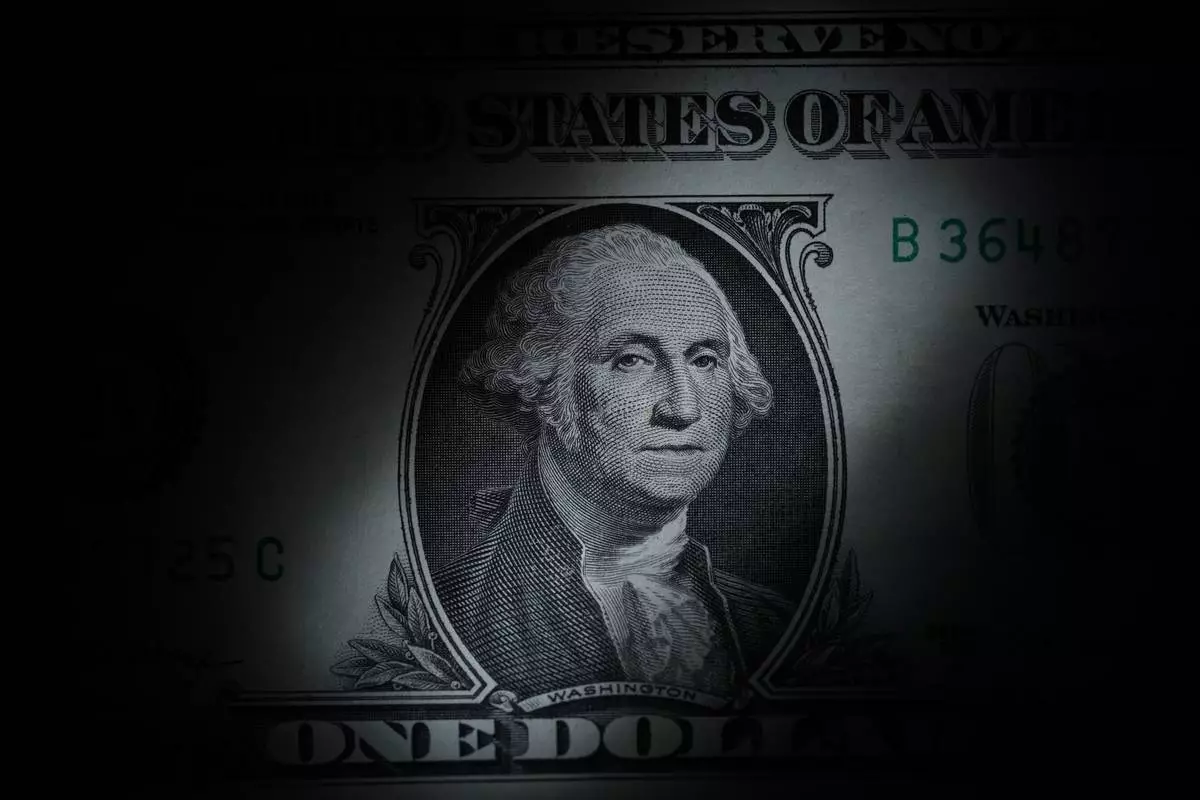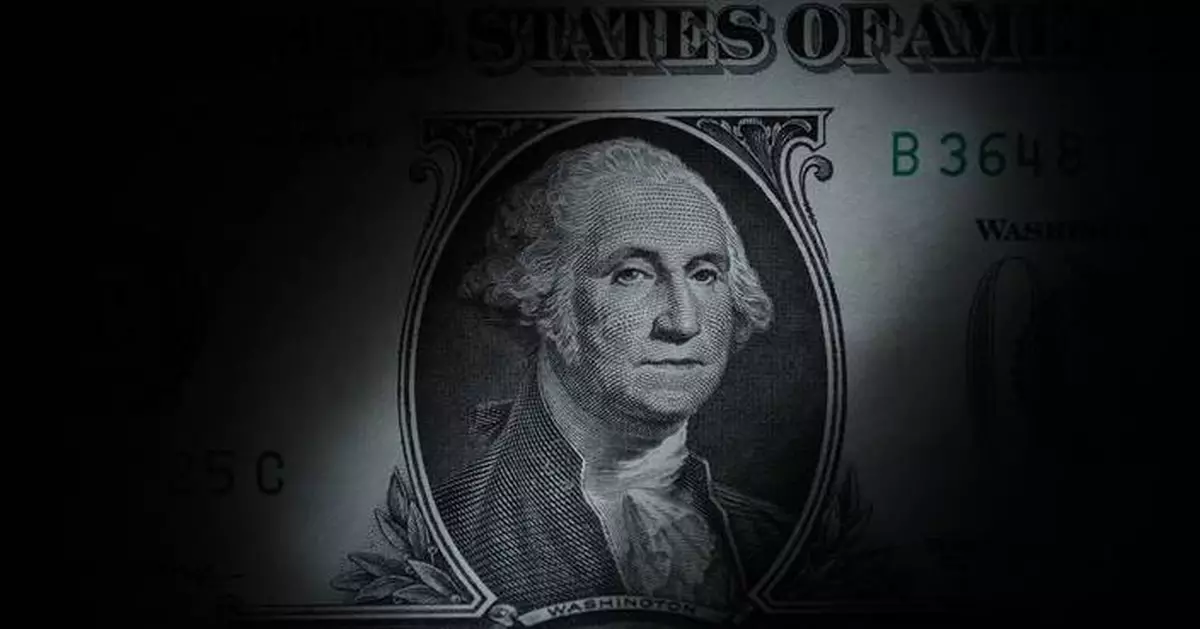NEW YORK (AP) — Among the threats tariffs pose to the U.S. economy, none may be as strange as the sell-off in the dollar.
Currencies rise and fall all the time because of inflation fears, central bank moves and other factors. But economists worry that the recent drop in the dollar is so dramatic that it reflects something more ominous as President Donald Trump tries to reshape global trade: a loss of confidence in the U.S.
The dollar's dominance in cross-border trade and as a safe haven has been nurtured by administrations of both parties for decades because it helps keep U.S. borrowing costs down and allows Washington to project power abroad — enormous advantages that could possibly disappear if faith in the U.S. was damaged.
“Global trust and reliance on the dollar was built up over a half century or more," says University of California, Berkeley, economist Barry Eichengreen. "But it can be lost in the blink of an eye.”
Since mid-January, the dollar has fallen 9% against a basket of currencies, a rare and steep decline, to its lowest level in three years.
Many investors spooked by Trump don't think the dollar will be pushed quickly from its position as the world's reserve currency, instead expecting more of a slow decline. But even that is scary enough, given the benefits that would be lost.
With much of world's goods exchanged in dollars, demand for the currency has stayed strong even as the U.S. has doubled federal debt in a dozen years and does other things that would normally send investors fleeing. That has allowed the U.S. government, consumers and businesses to borrow at unnaturally low rates, which has helped speed economic growth and lift standards of living.
Dollar dominance also allows the U.S. to push around other countries like Venezuela, Iran and Russia by locking them out of a currency they need to buy and sell with others.
Now that “exorbitant privilege," as economists call it, is suddenly at risk.
"The safe haven properties of the dollar are being eroded," said Deutsche Bank in a note to clients earlier this month warning of a “confidence crisis." Added a more circumspect report by Capital Economics, “It is no longer hyperbole to say that the dollar’s reserve status and broader dominant role is at least somewhat in question."
Traditionally, the dollar would strengthen as tariffs sink demand for foreign products.
But the dollar not only failed to strengthen this time, it fell, puzzling economists and hurting consumers. The dollar lost more than 5% against the euro and pound, and 6% against the yen since early April.
As any American traveler abroad knows, you can buy more with a stronger dollar and less with a weaker one. Now the price of French wine and South Korean electronics and a host of other imports could cost more not only due to tariffs but a weaker currency, too.
And any loss of safe-haven status could hit U.S. consumers in another way: Higher rates for mortgages and car financing deals as lenders demand more interest for the added risk.
More worrisome is possible higher interest rates on the ballooning U.S. federal debt, which is already at a risky 120% of U.S. annual economic output.
“Most countries with that debt to GDP would cause a major crisis and the only reason we get away with it is that the world needs dollars to trade with,” says Benn Steil, an economist at the Council on Foreign Relations. ”At some point people are going to look seriously at alternatives to the dollar. ”
They already have, with a little help from a U.S. economic rival.
China has been striking yuan-only trading deals with Brazil for agricultural products, Russia for oil and South Korea for other goods for years. It has also been making loans in yuan to central banks desperate for cash in Argentina, Pakistan and other countries, replacing the dollar as the emergency funder of last resort.
Another possible U.S. alternative in future years if their market grows: cryptocurrencies.
Said BlackRock Chairman Larry Fink in his annual shareholder letter about dollar dominance, ”If deficits keep ballooning, America risks losing that position to digital assets like Bitcoin.”
Not everyone is convinced that a big reason the dollar is falling is because of lost faith in the U.S.
Steve Ricchiuto, an economist at Mizuho Financial, says dollar weakness reflects anticipation of higher inflation due to tariffs. But even if investors aren’t as comfortable holding dollars, he says, they really don't have much of a choice. No other currency or other asset, like yuan or bitcoin or gold, is vast enough to handle all the demand.
“The U.S. will lose the reserve currency when there is someone out there to take it away," Ricchiuto says. "Right now there isn’t an alternative.”
Maybe so, but Trump is testing the limits.
It's not just the tariffs, but the erratic way he’s rolled them out. The unpredictability makes the U.S. seem less stable, less reliable, and a less safe place for their money.
There are also questions about his logic justifying the policy. Trump says U.S. tariffs will drive down trade deficits, which he cites as evidence that countries are “ripping off” America. But in calculating the tariffs, he looked at trade deficits only in goods, not services in which the U.S. excels. Most economists think trade deficits are not a sign of national weakness anyway because they do nothing to impede economic growth and prosperity.
Trump has also repeatedly threatened to chip away at the independence of the Federal Reserve, raising fears that he will force interest rates lower to boost the economy even if doing so risks stoking runaway inflation. That is a sure fire way to get people to flee the dollar. After Fed Chair Jerome Powell said Wednesday that he would wait to make any rate moves, Trump blasted him, saying “Powell’s termination cannot come fast enough!”
Economists critical of Trump’s April 2 tariff announcement recall another event, the Suez Crisis of 1956, that broke the back of the British pound. The military attack on Egypt was poorly planned and badly executed and exposed British political incompetence that sank trust in the country. The pound fell sharply, and its centuries-long position as the dominant trading and reserve currency crumbled.
Berkeley’s Eichengreen says Liberation Day, as Trump called April 2, could be remembered as a similar turning point if the president isn't careful.
“This is the first step down a slippery slope where international confidence in the U.S. dollar is lost."

FILE - The likeness of George Washington is seen on a U.S. one dollar bill, March 13, 2023, in Marple Township, Pa. (AP Photo/Matt Slocum, File)























































